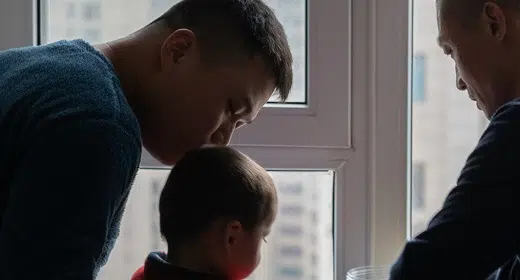by Zeyi Yang: Their journey starts in a country where gay marriage and surrogacy are illegal, and spans four years, two continents, and hundreds of thousands of dollars—all to get a kid of their own…
efore Qiguang Li could pass through customs and step onto U.S. soil for the first time, he faced a three-hour detention where he learned that he needed to be more candid about his identity. It was September 2015, after a long flight from Shanghai to Los Angeles. Li came with another man, Wei Xu, who asked a U.S. Customs and Border Protection (CBP) officer whether the two of them could go through the border screening together. “What’s your relationship?” asked the officer. They said they were friends. “Then you can’t.”
So, Xu went first and passed the screening. He forgot one important thing though: Li’s travel documents were in Xu’s bag. Li, 37 at the time, spoke poorer English and couldn’t properly explain to the officer what had happened. After a while of anxious waiting, Xu returned to the checkpoint to look for Li, still unaware of his mistake, and they were both sent to a room for additional screening.
In the secondary screening room — commonly referred to by Chinese travelers as the “small dark room” — Xu and Li waited almost three hours, believing that they would be denied entry. An officer asked them why one’s documents were in the hands of the other. Xu kept explaining that they were very close friends, until at one point the officer asked, “Are you two partners?”
“Yes,” Xu admitted.
And then everything changed. Xu learned that if they had said they were partners from the beginning, they would have been allowed to go through border control together, avoiding all the drama. “But we felt kind of ashamed to say that,” he recalls.
The unexpected incident was the prelude to a carefully planned trip into another country where their sexuality was much more accepted than at home. There were a few other things they didn’t mention to the CBP officers. Li and Xu, a gay couple who have been together since 2007, would walk out of the airport, get married two days later in Los Angeles, and, more important, start their journey toward parenthood.
From 2015 to 2018, Li and Xu made four transpacific trips as part of their gestational surrogacy processes. They traveled nearly 50,000 miles, spent more than $200,000, and went through countless days of distress, all to fulfill the dream of having their own family.
An increasing number of Chinese gay men, like Li and Xu, are traveling thousands of miles and spending hundreds of thousands of dollars to pursue a dream that is impossible at home. Like Li and Xu, many of them refer to their surrogacy process as their “journey.”

For this story, I spoke to a dozen gay Chinese men who have begun or completed surrogacy in the United States. Almost all of them started considering it between the ages of 30 and 40, and they often discussed how one needs to be extremely devoted to the idea of having his own child before embarking on the lengthy and often excruciating surrogacy journey. But they also often mentioned mianzi, the nuanced Chinese concept that literally translates to “face” but also means social standing and dignity. Li says that for many gay men, the strong push for babies comes from the elder generation. The social and cultural norm in China, inherited from thousands of years of patriarchal traditions, is that having a descendant of your own blood is necessary for a good life. Although this idea is under fierce attacks from some in China’s younger generation, it still resonates with many young Chinese people, including some gay men who are asked, or volunteer, to have a child to protect the mianzi of their parents and themselves.
For some of the parents, that means going as far as pushing their sons into the surrogacy journey. David Wang, a single, gay man of 28, living in the southwestern province of Sichuan, says it took years for his parents to accept his sexuality after he came out in 2013. But once they had, his parents offered to pay for all of the expenses of surrogacy — if he would start as soon as possible.
“My parents’ main argument was that they don’t want me to end up aging alone,” says Wang, who was single and hesitant at the time. He eventually conceded to his parents’ wishes and made it through the bumpy surrogacy journey as a single father. In February 2019, Wang and his mother flew to Atlanta to be at the birth of his son and take him back home.
Dr. Guy Ringler, a physician with California Fertility Partners, tours in China to give medical consultations about surrogacy. His patients include one of the country’s most influential gay figures, Ma Baoli, founder of the world’s biggest gay dating app, Blued.
“I have several patients who told me that they came out to their parents after their baby was born,” says Dr. Ringler, who is a gay dad through surrogacy himself. “And they said that it was so much easier because the parents don’t care anymore. Because they have grandchildren, it’s not that big of a deal anymore.”
Xu and Li were in a similar situation. Li has a brother, which significantly eased his pressure from the family; Xu doesn’t, so they made the decision that their first child would be Xu’s biological son.
Xu didn’t come out to his parents until midway through the surrogacy process, when, after two trips to the United States, he felt unable to conceal it anymore. It was a smooth coming out. The parents soon joined the excitement over a prospective baby. The couple’s decision to have a child became the tie between two generations.
” alt=”” aria-hidden=”true” />

Xu took responsibility for researching everything they needed to do. In January 2015, eight months before he and Li were awkwardly detained by U.S. Customs, Xu went on a lonely trip to America to learn from scratch, with no knowledge about surrogacy except for the name and address of a Chinese-American fertility doctor in California.
In the five years since Xu and Li’s journey began, information about surrogacy has become easily accessible in China. Despite the censorship of words like “surrogacy” — which is officially banned in China, although the law isn’t always strictly enforced — low-profile sharing and guidance flourish in online forums. Commercial ads for assisted reproductive technology have grown into a major sponsorship source for local LGBTQ organizations and apps. On the Chinese messaging app WeChat, groups for gay dads and future dads have mushroomed. Xu and Li joined the first such group chat in 2016, which has a self-explanatory name: “Group for Dads of American Babies.” In 2019, the group had more than 100 members, to whom more than 10 babies were born that year.
Several American surrogacy agencies and fertility clinics told me that they’d seen a surge in Chinese clients, starting in around 2013, with gay people making up a significant portion of the clientele. The number of Chinese clients at the Fertility Center of Las Vegas “exploded” in 2013, according to Joanne Zhou, the center’s director of China operations: “Before that, we would only have a few Chinese clients annually, but from then on, we had double digits of them every month.”
“Economic development in China … has created a number of middle-class people, including those who are homosexual,” observes Zhijun Hu, who, under the famous alias “Ah Qiang,” has been working as an LGBTQ activist in China for more than 20 years. “This group of people has brought about a strong demand for babies.”
The demand has lured many American agencies and clinics to expand their outreach to China through more advertisements and offline consultations. It has also created a new Chinese domestic market that specifically helps to connect the LGBTQ community to resources in the United States. Intermediary companies, many founded by the early surrogacy clients, provide packages of services, including everything from translation to references for attorneys and nannies. Having an American baby through surrogacy has now become a popular and accessible life goal for urban gay men in China.
Surrogacy usually involves both a surrogate mother and a different egg donor. The sperm and egg are collected, the egg is fertilized, then the embryo is transferred into the surrogate’s uterus. The egg donor is sometimes referred to by Chinese intended parents as luanmei, or “egg girl,” though the term is now seen as derogatory by some. To match with an egg donor, intended parents choose from a database of profiles, which list the donor’s age, race, medical history, education and much more.
According to several surrogacy agency staff and fertility doctors, straight Chinese couples are often strict about finding Asian egg donors, since many of them wish to pretend that the baby has been conceived naturally. Most gay couples don’t have this concern and, sometimes, even like the idea of having mixed-race babies, whose looks are often appreciated in China. Being flexible on race also means significantly less waiting time and cost, because the demand for Asian egg donors in the United States far outnumbers the supply.
Xu and Li signed a contract with a Latina donor who was attending college and has dark hairs and dark eye colors –– in their words, “less Westerner-looking features.” They met her in person on their 2015 California trip. In January 2016, 28 eggs were retrieved from the donor, and 17 were successfully fertilized. Thirteen of the 17 embryos, referred to as “semifinalists,” survived into their fifth day in the lab and were given a genetic test. Eight healthy embryos passed the test. They hoped that one of these “finalists” would become Xu’s baby.

The genetic testing, expensive but optional, not only enables parents to prevent implanting embryos with higher likelihoods of having genetic diseases. However, it also allows them to foresee the gender.
Gender selection, though legal in the United States, is banned in China, where gender-based discrimination and the troubled history of the one-child policy have resulted in an absurdly unbalanced sex ratio at birth. According to a recent World Economic Forum report, China has a female-to-male sex ratio at birth of 0.885 –– for every 1,000 male newborns, there are only 885 females –– ranking last among all 153 countries studied.
Many U.S. agencies and clinics confirm that gay Chinese intended parents have a noticeable preference for sons, though some note that they see the same preference across gay men of all nationalities.
Xu wanted a son. The genetic testing reported that he had five male embryos to choose from among the eight healthy ones. It also told him that he had two “super embryos” that rated 6AA in HRC Fertility’s system, indicating the highest success rate for transfer. It seemed like there were plenty of good options, considering that they only needed one. But the couple would soon learn that high-quality embryos were not always enough.
In September 2016, their chosen embryo was transferred to the surrogate. They received the good news 12 days later that the implantation was successful.
Another week later, different news came: It was a biochemical pregnancy — a very early miscarriage, before the embryo grew large enough to be seen via ultrasound. Two men with little knowledge about women’s health, they had learned this term only several months earlier when the agency told them that their surrogate had already had one recent biochemical pregnancy. It was an accident, the agency told them, and would not affect the mother’s health or her ability to carry their child. But now Xu and Li were nervous and wavering. Should they continue with a surrogate who’d now had two miscarriages?
They decided to give it another try. On December 2, 2016, the second embryo was successfully transferred. Everything looked good in the weeks that followed. One morning seven weeks later, however, Xu received an email from the clinic: The surrogate mom had just gone to a regular examination, and no fetal heartbeat could be detected.
Li was devastated. He couldn’t focus on work when he was at the dry cleaners. How could this happen to them again, he kept thinking: Was it because the surrogate was too old? Was it because she hadn’t taken as much care as the Chinese tradition requires?
Two of their “super embryos” were gone. They decided not to work with the surrogate again, and went back to searching the surrogate database.
Xu and Li spent a full year looking through surrogate profiles and trying to match with an ideal one. Xu would refresh the online database two or three times a week to check whether a new surrogate had been added. Some made it clear in their profiles that they didn’t wish to carry a baby for Asian parents or same-sex parents. Most didn’t live in California, the only state Xu and Li had been to at that time, but they decided not to limit their options to one state. Colorado, Arizona, Georgia, Pennsylvania: “For a year we just flipped through their profiles and studied the American map, from the West Coast to the East Coast,” says Xu.
In the United States, legal regulation of surrogacy varies by state. About 10 states, including California, have either clear statutes permitting surrogacy or a history of favorable court orders. New York and Michigan forbid any form of compensated surrogacy, while Louisiana only permits it for married heterosexual couples. The majority of states fall somewhere in between, with no law specifically prohibiting surrogacy. Agencies require surrogates to live in the more friendly states and deliver the baby there to avoid legal troubles.
Three times, Xu and Li made up their mind and chose a potential surrogate after speaking with her via video, but then she didn’t pass the screenings. A woman in Denver was tested and her uterine lining was found to be too thick; a 19-year-old was excluded because the nurse doubted whether she could handle the responsibility at such a young age; an Army wife in Kansas tested positive for chlamydia, the second time in her medical history, posing a threat of repeated occurrences. Their fourth choice, an Atlanta woman, made it past all of the medical and psychological screenings only to get cold feet at the last minute.
Then, at a holiday gathering, Ann was chatting with an acquaintance who had recently given birth. Ann asked how the child was doing. “Oh, it’s a baby girl,” the woman replied. “She’s fine. She’s in China.”
“What do you mean she’s in China?” asked Ann.
“It wasn’t mine. I was a surrogate.”
At the time, Ann was pregnant with her fifth child. She had lost her parents at a very young age and didn’t have any siblings. She’d always wanted a big family and still loved the feeling of being pregnant. After a little research about surrogacy, Ann told her husband that she wanted to become a surrogate to help unfortunate families. “You are kidding,” he responded. “No, I’m really serious,” Ann said. “It’s easy for me to have one. What if I were to give that gift to someone?”
She went through the routine of becoming a surrogate: a psychological questionnaire with tons of yes-or-no questions; two different physicians combing through her medical history. One day in late 2017, Ann was told by the agency that she had been matched with a same-sex couple in China. She downloaded WeChat. In an hour-long video chat, Ann met Xu and Li for the first time.
The first meeting was a back-and-forth of questions between Ann and the couple. They asked her about her daily life and her job, and she asked them about what their journey had been like so far. “I just wanted to see if they were talkative, or, if they were, you know, happy people,” recalls Ann. “They are. They are very warm.”
The couple seemed a little shy to her, but Ann also found that they could easily get her jokes. Xu and Li liked Ann a lot too. They soon started to talk every day on WeChat.
Ann began the in vitro fertilization (IVF) process, which required a two-hour drive from San Diego to the fertility clinic in Pasadena every other week during the IVF cycle. She also quit her job as a catering service manager at a hotel, because it had too much hands-on and late-hour work. “I knew it was going to be a process, with my husband being deployed in the military and [me] having kids. I told my husband that I wanted to focus on the gift that I was giving to the family,” says Ann.
In February 2018, she successfully completed the embryo transfer, a five-minute process that, as she viewed it on the monitor, Ann compared to the flash of a firework. She kept messaging the couple about her medical visits. Then one day, she sent them a recording of the fetal heartbeat.
When the pregnancy reached three months, Xu and Li flew to San Diego to meet Ann and her family. This was May 2018, their third trip to the United States, after two years of struggle and disappointment.
Ann took them to a 4D ultrasound screening, where the couple got to see their future baby for the first time. The fetus was moving inside Ann’s womb, not much bigger than a peanut, but the head and limbs were discernible. They went to Ann’s house the next day and met her two youngest children. It looked so nice to have a big family, Xu thought. If it weren’t so expensive to have a child through surrogacy, they would consider another one.

Xu estimates that he spent $30,000 more than expected before he met Ann. The miscarriages, the surrogates who backed out at the last minute, all of those costs were paid by the intended parents. At the time, Xu didn’t know that he would also be spending a lot more after his son was born, including a $6,000 bill on phototherapy for neonatal jaundice, because the baby didn’t have medical insurance. There are only a few insurance options for surrogacy newborns, and even fewer for those with international parents, and they can come with deductibles as high as $40,000. In the end, Xu and Li spent about $200,000 in total. The high cost of surrogacy means that it remains an option only for the privileged in China.
As the delivery date approached, Ann knew that this would be a new experience. Her five children’s births had all been easy. But Xu’s baby was much larger, weighing almost nine pounds at birth.
On Friday, October 12, 2018, Ann was admitted to the hospital after being told the day before that her vitals were too high and she needed an induced labor. Xu and Li, having arrived in San Diego three weeks earlier, went with her. Ann was given an epidural on Saturday morning, but things turned scary that night. “My water never broke, so they had to do it manually. And my vitals had dropped. I was in extreme pain,” she recalls. “That’s when I suggested, ‘Are we going to have a C-section?’ And they said, ‘Yeah, you are probably looking toward that.’ I said, ‘OK, can we let Xu and Li know?’”

At 4 o’clock on Sunday morning, the baby was born. A nurse took the newborn to another room to meet Xu and Li, who had been at the hospital for 48 hours. Three years of planning hadn’t prepared them for this moment. The baby was paler and smaller than Xu expected. “He still looked so tiny,” he says. Xu and Li marveled at the newborn’s cone-shaped head and tried to determine if they saw any resemblance to Xu.
When Ann came out of the delivery room a few hours later, they were waiting at the door to show her the baby. “I was very happy to see Xu and Li’s faces,” she remembers. “I know I was able to give them my gift they have so longed for. You could see in their eyes.” Three months earlier, the couple had invited her to think of an English name for the newborn. Ann named him Diego, as in San Diego, the city where they met and where the baby was born.
Xu and Li took on different roles after the birth. Li looked after Diego at their rented San Diego apartment, while Xu drove around to apply for all of the legal documents they needed to bring the baby home.
One month later, they flew back to China with the baby. They had sold their dry-cleaning business, so that they could both stay at home and attend to the baby, and they moved back to Nantong, a smaller harbor city where Xu’s parents lived. There, they were able to afford a bigger apartment, where Diego would have more space to play, and it would be easier for the grandparents to help take care of him. Xu’s parents are overjoyed with their grandson, always asking Xu and Li to send Diego over and let Grandpa and Grandma take care of him.

Another reason for their move is the cheaper cost of attending dual-language private schools in Nantong. Diego automatically obtained U.S. citizenship, and Xu wants him to learn English in case he wants to go back at some point in his life.
They consult with other gay dads about how to look after and educate a child. In the Group for Dads of American Babies chat group, they ask questions about practical things like supplements, and discuss the challenges of parenting, which is still generally viewed as a woman’s duty in China.
Ted Zhou, a member of the chat group who is expecting his baby to be born through surrogacy in 2020, says that most gay Chinese parents are particularly eager for information about how to parent. “An overwhelming number of Chinese dads don’t know how to parent. But in a family setting like this, you cannot avoid the responsibility.”

Xu and Li still have daily conversations with Ann. Because of the cesarean and other complications during the delivery, her doctor doesn’t recommend surrogacy ever again. But she is happy to have been able to help Li and Xu on their journey. On Diego’s first birthday, Ann sent them a package full of baby clothes and toys.
Diego learned to walk recently. With each passing day, he is getting more energetic and more adventurous, toddling around at home and grabbing the dog food to take a bite. Li often feels the burnout as a 40-year-old new dad: “When he takes an afternoon nap, I have to take one too. Otherwise … I just don’t have the energy to deal with him eight hours straight before he goes to bed.”
Li and Xu once wanted two children, but they don’t know whether they want to repeat all of the effort, the thousands of miles of transpacific trips, not to mention spending another $200,000. “But if our conditions permit a second child,” says Xu, “we might consider a girl.”

















































